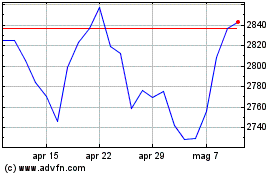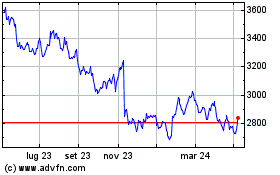NIH Ends Study on Health Benefits of Alcohol, Citing Improper Ties to Industry
15 Giugno 2018 - 8:47PM
Dow Jones News
By Thomas M. Burton
The National Institutes of Health terminated a study into the
benefits and risks of moderate drinking, concluding that the
agency's staff had improperly interacted with the
alcoholic-beverage companies to get funding.
NIH Director Francis S. Collins said his agency's dealings with
the alcoholic-beverage industry were early and frequent and that he
plans to investigate to ensure that the handling of this one study
was unique and not representative of the agency's work overall.
Anheuser-Busch InBev SA, Heineken Holding NV, Diageo PLC, Pernod
Ricard USA LLC and other alcohol companies had agreed to pay for
most of the $100 million study through donations to a private
foundation that raises money for the NIH. The NIH's National
Institute on Alcohol Abuse and Alcoholism oversaw the study and
planned to contribute funds to the research.
In a meeting Friday of an advisory board to Dr. Collins,
Lawrence A. Tabak, NIH principal deputy director, said an outside
report on the study that was commissioned by the NIH concludes that
NIAAA officials "appear to have intentionally biased the framing of
the scientific premise" of the study in the direction of focusing
on possible benefits of alcohol.
The report said that email correspondence involving NIAAA staff,
outside researchers and the alcohol industry "appear to be an
attempt to persuade industry to provide funding" for the study.
Also at the meeting, NIAAA director George Koob said, "I'm
disappointed in what transpired. I think the trial is irrevocably
damaged." He said he also concluded that "we did not see a truly
open competition" in selecting the outside investigators to conduct
the alcohol research.
Dr. Collins testified before a Senate committee last month that
the funding source, along with NIH employees' soliciting of funds
for the research, "would violate our usual policies." The issue has
"caused considerable pain and stress upon the people involved," and
the NIH would make a decision about whether the study still should
be conducted, he said.
The main grantee under the research is Beth Israel Deaconess
Medical Center in Boston, which has said it has policies in place
to ensure the scientific and medical validity of the research.
An article in the New York Times in March described two
scientists, as well as a federal health official, pitching the
study to liquor company executives in 2014 in a gathering in Palm
Beach, Fla. Dr. Kenneth J. Mukamal, associate professor of medicine
at Harvard Medical School and the study's lead investigator, and
Dr. John Krystal, a Yale University neuroscientist, said in their
presentation that a randomized clinical trial could clarify the
possible benefits of moderate drinking.
Dr. Mukamal didn't respond immediately to a request for
comment.
Dr. Krystal said the risks and benefits of alcohol use have been
"hotly contested" based on complex epidemiologic data.
"We have long needed a prospective, randomized, controlled trial
to enable us to make sense of the epidemiologic data," he said in
an email. The study, he said, "will be the first definitive test"
of the notion that alcohol has health benefits.
NIH officials said they have already spent $4 million on the
study.
Write to Thomas M. Burton at tom.burton@wsj.com
(END) Dow Jones Newswires
June 15, 2018 14:32 ET (18:32 GMT)
Copyright (c) 2018 Dow Jones & Company, Inc.
Grafico Azioni Diageo (LSE:DGE)
Storico
Da Giu 2024 a Lug 2024

Grafico Azioni Diageo (LSE:DGE)
Storico
Da Lug 2023 a Lug 2024
